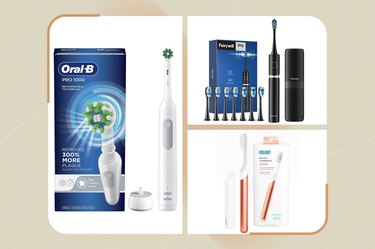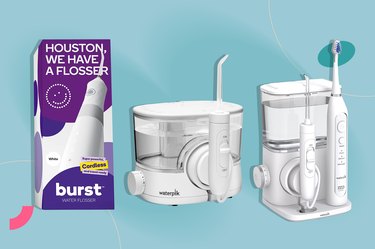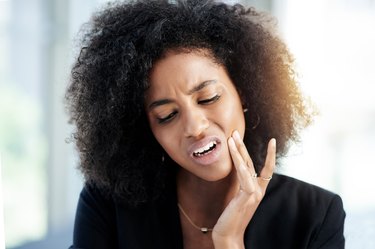
If it seems like your teeth are looking a little longer these days, take note. You could have receding gums, which can up your risk for sensitivity, cavities and tooth loss.
Gum recession is a gradual problem that happens when the gum tissue pulls away from the teeth, exposing the teeth roots. It can occur throughout your mouth or around just one tooth, according to the Cleveland Clinic.
Video of the Day
Video of the Day
Sometimes you can spot the problem just by looking in the mirror, and if you have a mild case, it might not cause other symptoms. But gum recession that grows more severe can eventually cause tooth pain and sensitivity and even make your teeth feel wiggly or loose.
Knowing what's behind the recession can help you manage the problem. Here are seven causes of receding gums, plus what you can do to protect your gums and teeth.
1. You're Brushing Too Hard
Brushing regularly is a must for mouth health. But being overzealous about it can actually irritate your gum tissue, causing inflammation that could lead to gum recession over time, according to a May 2016 study in Dental Press Journal Orthodontics.
Same goes for using a toothbrush with too-hard bristles. A firm- or even medium-bristle brush can be too rough on your gums, so go for soft bristles only.
Fix It
You should brush your teeth twice a day (and floss at least once a day), but don't go too hard.
"The proper level of intensity for brushing your teeth is to use gentle, circular motions with a soft-bristled toothbrush," says Michael Wei, DDS, a dentist based in New York City.
If you tend to scrub too hard, try holding the brush with only your thumb, index and middle fingers — this gives you less leverage and may serve as a reminder to go easier.
You might also consider investing in an electric toothbrush with a pressure sensor, such as the Oral-B iO Series 10 Rechargeable Electric Toothbrush ($400 from Oral-B or Amazon) or the Philips Sonicare DiamondClean Smart 9500 Rechargeable Electric Toothbrush ($280 from Amazon).
2. You've Got Plaque or Tartar Buildup
Not brushing often enough can make your gums recede too. Poor dental hygiene can cause plaque (a sticky film on the teeth from bacteria and food) and tartar (hardened plaque that can cause tooth decay) to build up around the gum line, which can also make them inflamed.
As a result, "the tissue can be weakened and more susceptible to recession," Dr. Wei says.
Fix It
Keep plaque from building up by brushing your teeth twice a day for at least two minutes, recommends the American Dental Association (ADA).
Floss at least once a day (ideally before brushing), and follow up by rinsing with an antibacterial mouthwash like Colgate Total Advanced Pro-Shield Mouthwash ($4.96 on Amazon) to clear out any leftover food bits you might've missed, Dr. Wei recommends. (Avoid mouthwashes containing alcohol, which can dry out your mouth.)
Your dentist can also scrape away any buildup during your regular cleanings (that is, every six months or so).
3. It's Gum Disease
Plaque and tartar can eventually creep under your gumline, causing further gum inflammation that can lead to gum disease, or infected gums.
The problem can make your gums red, swollen and inflamed, which can cause them to recede, per the National Institute of Dental and Craniofacial Research.
Over time, severe gum disease can also make it painful to chew and even cause your teeth to become loose or fall out.
Fix It
See your dentist if you have signs of gum disease. The problem can often be managed with a deep dental cleaning that gets rid of the bacteria under your gumline.
In some cases, your dentist might also apply antibiotics directly under your gums to clear the infection, according to the Cleveland Clinic.
4. You Grind Your Teeth
Repeatedly grinding your teeth can put stress on your gums, eventually causing them to become swollen and inflamed. Over time, that inflammation could contribute to gum recession, Dr. Wei says.
Tooth grinding, or bruxism, can happen to anyone, but the problem is often triggered by unmanaged anxiety, notes the Mayo Clinic. Most people who grind their teeth don't realize they're doing it (because it often happens while you're sleeping), but it can also cause tooth pain or sensitivity, tight jaw muscles, headaches or pain around your jaw, neck or ears.
Fix It
See your dentist if tooth grinding is causing symptoms. They might recommend wearing a mouthguard at night or practicing relaxation techniques to manage your stress, the Mayo Clinic says.
5. You've Got Crooked Teeth
Teeth that are tipped or rotated could harm your gums.
"If there is misalignment between teeth, the gum tissue that covers the root may be more exposed to trauma and wear and tear from activities like chewing or brushing. This can lead to gum recession," Dr. Wei says.
Fix It
If your dentist suspects your tooth misalignment is harming your gums, they might refer you to an orthodontist. The orthodontist may recommend braces to straighten your teeth, which can help protect your gums, according to a May 2022 paper in the Journal of the American Dental Association.
"Invisible braces" might also be an option, like those from Byte or Invisalign.
6. You Smoke or Use Tobacco
You may know that smoking can cause tooth discoloration, but it can also affect your gums.
Tobacco use lowers your immune system and makes it harder for your gums to fight off infection, which can lead to gum inflammation and gum recession, notes the Centers for Disease Control and Prevention (CDC).
And the longer you smoke, the more likely you are to experience gum problems.
Fix It
The best way to protect your mouth from the effects of smoking and tobacco is to quit the habit.
Good dental habits can help too: Brush and floss regularly, and see your dentist regularly for cleanings, the CDC recommends.
7. It's Your Lip or Tongue Piercing
An oral piercing can increase your risk for gum recession over time, Dr. Wei says.
Sometimes the piercing causes irritation and inflammation that makes the gums recede. In other causes, the piercing can cause an injury that damages the teeth or gum tissue, which can also create gum inflammation, Dr. Wei notes.
Fix It
Good oral health is even more important if you have a lip or tongue piercing, so brush and floss regularly. Be fastidious about following your piercing care and cleaning instructions, too, including using a mouth rinse after eating, recommends the ADA.
Seek medical attention if the piercing starts to show signs of infection, like pain, swelling or redness.
"If irritation develops, it may be necessary to remove the piercing," Dr. Wei says.
How to Prevent Gum Recession
Receding gums can't "grow back," unfortunately, and you can't necessarily reverse receding gums at home. But there are things you can do to stop your receding gums from getting worse, and that comes down to some basic healthy habits.
"The best way is to practice good oral hygiene," Dr. Wei advises.
To protect your teeth and gums, the ADA recommends you:
- Brush your teeth twice daily and floss at least once daily. Apply firm but gentle pressure to avoid irritating your gums. If you're using an electric toothbrush, there's no need to push at all — let the brush do the work for you.
- Rinse with a mouthwash. An antibacterial option swishes away bacteria that could lead to gum infections.
- Visit your dentist regularly. Most people should have a dental exam and cleaning twice per year. You may need to go more often if you have risk factors for gum disease (like smoking, diabetes, taking medications that cause dry mouth or having an underlying disorder that affects your immune system).
- If you smoke, quit. Tobacco makes it harder for your body to fight off gum infections.
- Address dental problems promptly. Talk with your dentist about any issues you might be experiencing that could affect your gums, like tooth grinding, gum disease symptoms or crooked teeth.
When to See a Dentist About Receding Gums
It's a good idea to see your dentist twice a year for maintenance checkups. But you should schedule an appointment in between visits if you notice any signs of gum recession like pain or discomfort around your gum line, increased tooth or gum sensitivity or loose teeth, Dr. Wei advises.
"Your dentist can evaluate the severity of your gum recession and suggest the best treatment plan for you," he adds.
Treatment for receding gums might include the following, per the Cleveland Clinic:
- Deep cleaning, which can get rid of bacteria causing gum disease and inflammation
- Topical antibiotics, which can also treat gum disease
- Dental bonding, which involves placing a tooth-colored resin over the exposed root to make it less noticeable and improve symptoms like sensitivity
- Orthodontics, which can correct crooked teeth
- Gum graft surgery, which usually involves taking a graft of tissue from the roof of your mouth and attaching it to your gum line
- Cleveland Clinic: "Gum Recession"
- Dental Press Journal Orthodontics: "Gingival recession: its causes and types, and the importance of orthodontic treatment"
- American Dental Association: "Toothbrushes"
- National Institute of Dental and Craniofacial Research: "Periodontal (Gum) Disease"
- Journal of the American Dental Association: "Keeping Your Gums Healthy"
- Centers for Disease Control and Prevention: "Smoking, Gum Disease, and Tooth Loss"
- American Dental Association: "Oral Piercings"
Is this an emergency? If you are experiencing serious medical symptoms, please see the National Library of Medicine’s list of signs you need emergency medical attention or call 911.








